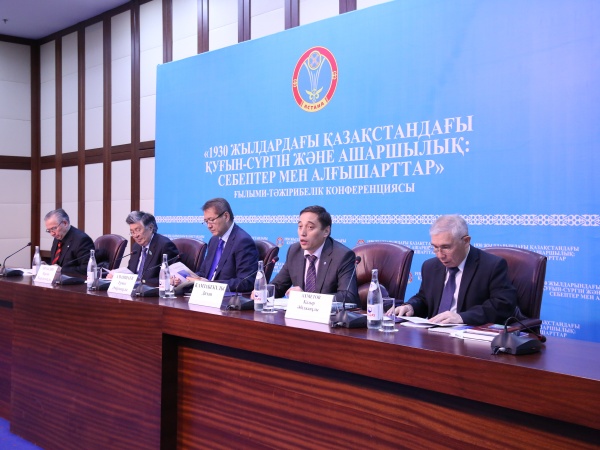ASTANA – A conference in memory of the victims of 20th century repression and starvation in Kazakhstan was held on May 31, Kazakhstan’s Day of Remembrance of Victims of Political Repression and Hunger, in the capital’s Palace of Independence.
“The purpose of such a conference is to understand the lessons of the history of political repression and famine in Kazakhstan from reliable sources, to pay tribute to the victims of the totalitarian system and to promote unity among the ethnic groups living in Kazakhstan,” said Astana Deputy Akim (Mayor) Yermek Amanshayev in his opening remarks at the event, according to the akimat website.
The 20th century was a difficult period for the Kazakh people, Amanshayev said; a time of hunger, war and repression. Kazakhstan was the site of some of the biggest labour camps of the Soviet Gulag system and contained 953 camps and settlements. Within a few dozen kilometres of the city is the former women’s camp, ALZHIR, which is an acronym for Akmola Camps of Wives of Traitors of the Motherland. Within a few hours are the remains of larger camps, such as Karlag in Karaganda and many others.
It is estimated that 14 million people moved through the Gulag labour camps from 1929–1953, and some 5 million people were sent to Kazakhstan over the years of repression, Kazinform reported. According to the akimat, 100,000 people were sentenced in Kazakhstan between 1921-1954 and 25,000 executed. Among those imprisoned were well-known Kazakh cultural figures and politicians, including writers and social activists Shakarim Kudayberdyuly, Beimbet Maylin, Myrzhakyp Dulatov, Saken Seifullin, Sanjar Asfendiyarov and Ilyas Dzhansugurov; educator and intellectual Akhmet Baitursynov; politicians and intellectuals Turar Ryskulov and Mukhamedzhan Tynyshpayev; and many others.
In the 1930s and 1940s, entire nations and ethnic groups were deported to Kazakhstan, including Koreans, Kurds, Iranians and others, and during World War II, Germans, Greeks, Chechens and Ingush people, among others, were also displaced, in numbers estimated to exceed one million people.
“The Communist regime recklessly … led a relentless, vulgar policy, and as a result more than 3 million people of Kazakhstan were lost. Such pain and tragedy do not go away. We need to talk about it now, so that such a tragedy does not happen again. From the past, we should learn a lesson,” said Professor Yesim Garifolla of Astana’s Gumilev Eurasian National University, an institution named after Lev Gumilev, who himself spent time in the Gulag.
One of Kazakhstan’s first acts as an independent country was to move to rehabilitate victims of political repression through a law passed in 1993. Since a presidential decree on the holiday was passed in 1997, May 31 has honoured those who were lost through oppression and famine.
Victims of political repression also receive financial compensation. The Strategy 2050 website reports that between 2003-2014, one-time cash payments totalling 2.9 billion tenge (US$15.6 million) were made to victims of repression, and 1.8 million tenge (US$9,680) has been allocated from the 2015 national budget for this purpose. Retired or disabled victims of repression also receive additional state support. The number of recipients as of May 1 this year was 35,793 people, according to Strategy2050.kz.
Other events in the capital to commemorate victims were held at the Alzhir camp museum and at Nazarbayev University. Events were also held in cities around the country.
